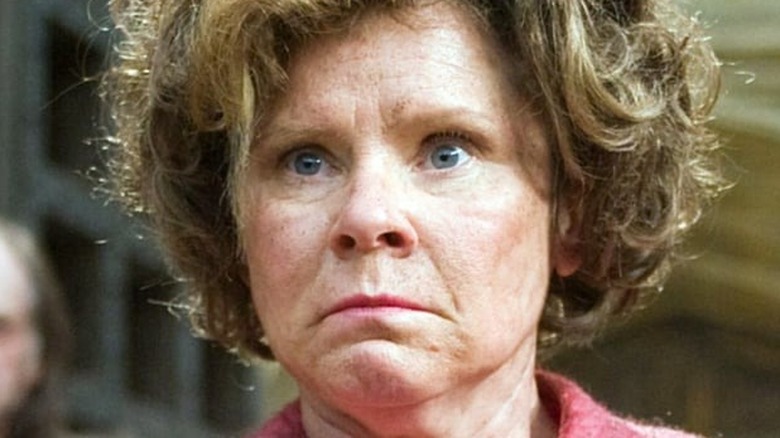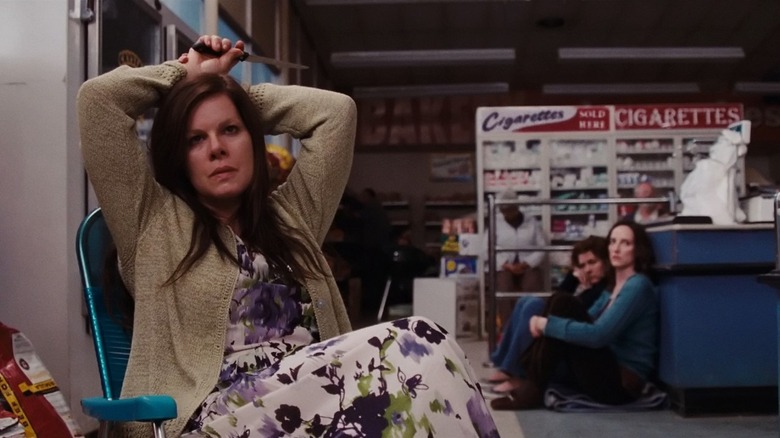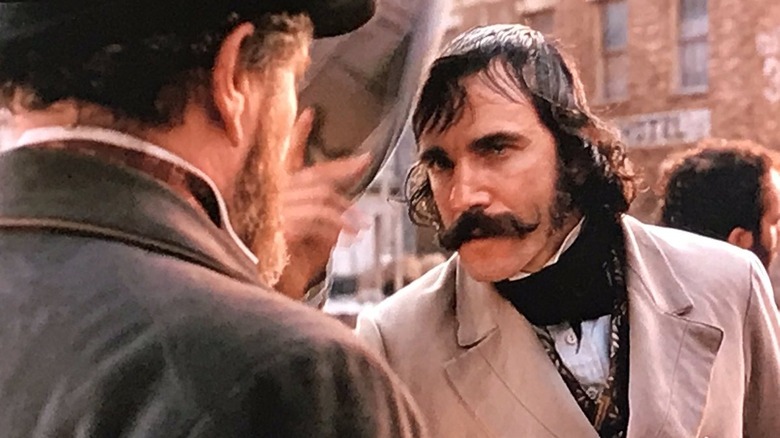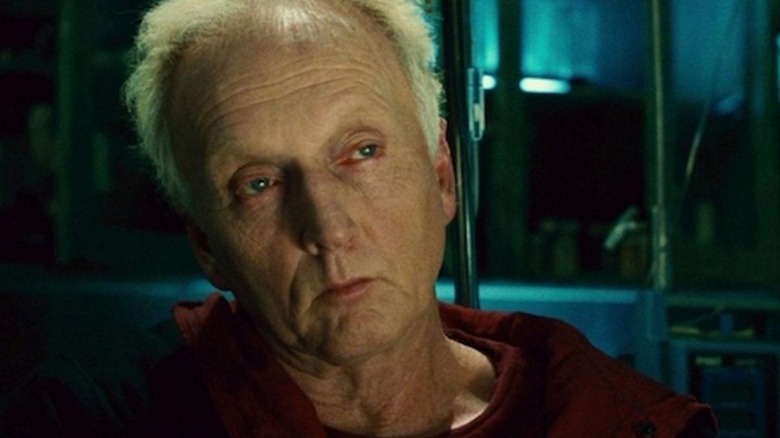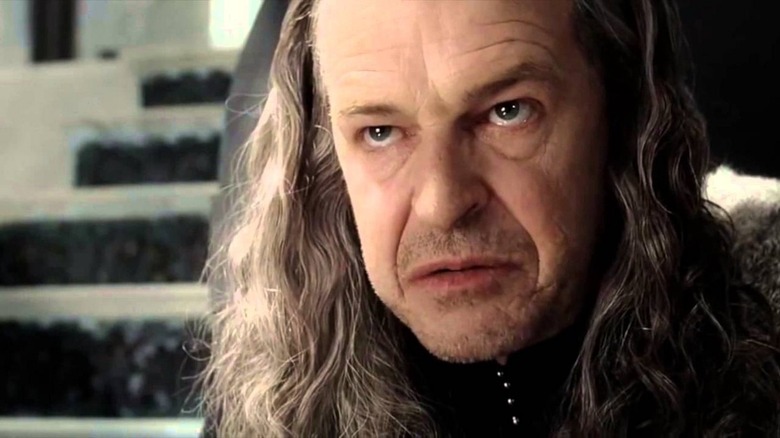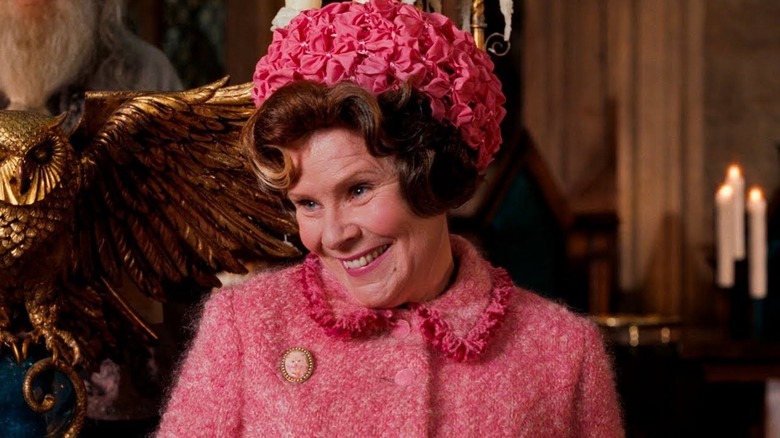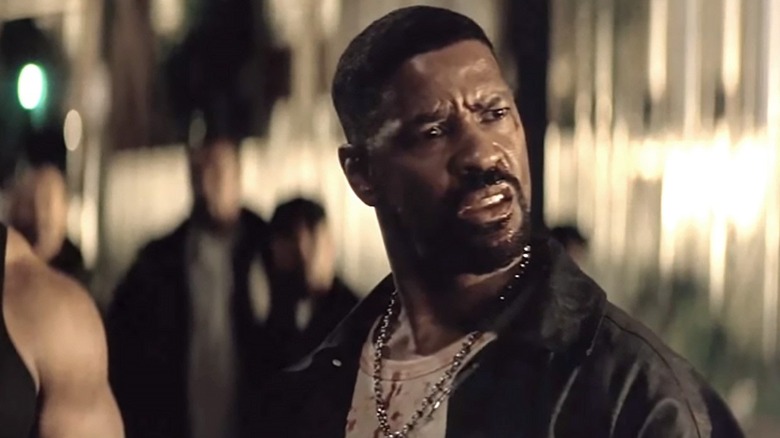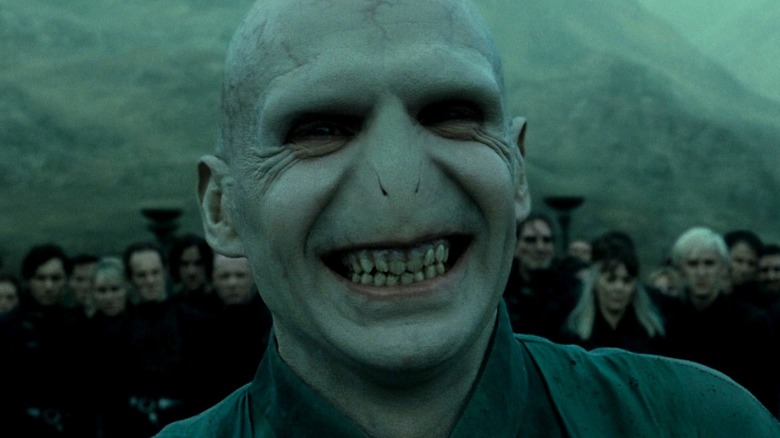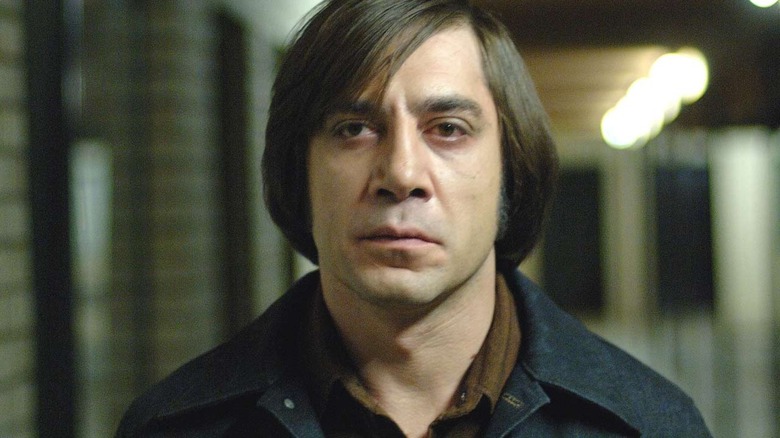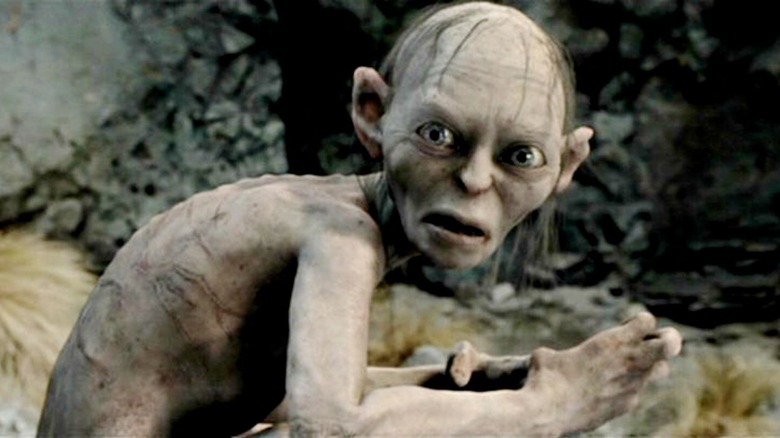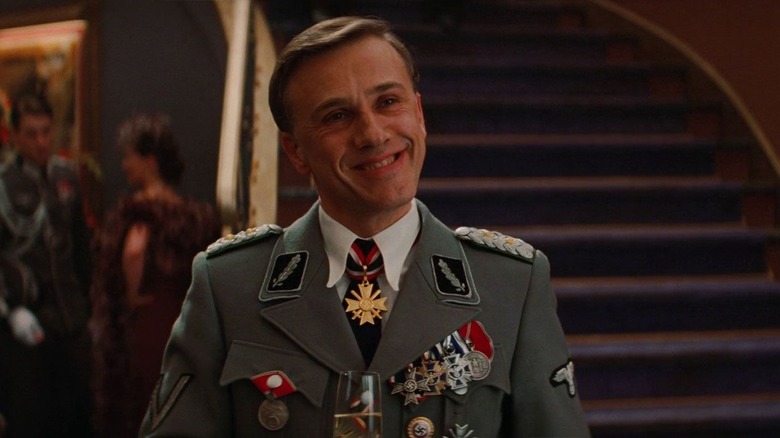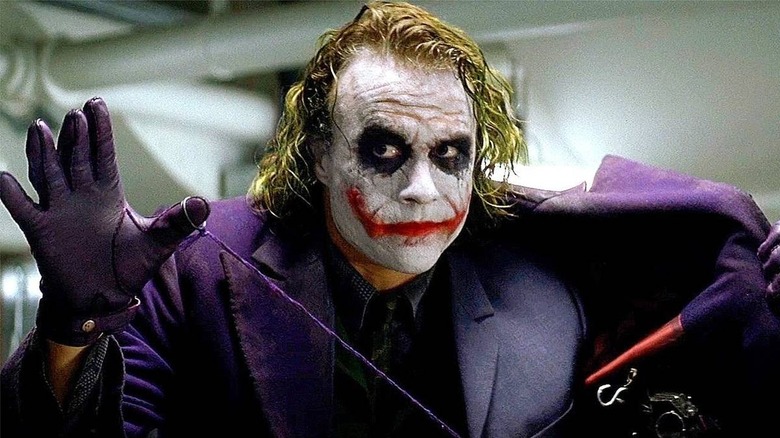Best Movie Villains Of The 2000s
Heroes aren't much without a good villain. Lousy bad guys put an unfair burden on everything and everyone else in the story, but a good villain is a rising tide that lifts all narrative boats. And the 2000s were packed with great, unforgettable baddies. So many, in fact, that many worthy villains, including Syndrome from "The Incredibles," Patrick Bateman from "American Psycho," Count Dooku from the "Star Wars" prequels, Obadiah Stane from "Iron Man," Two-Face and Scarecrow from "The Dark Knight" movies, Doctor Octopus from "Spider-Man 2," and Magneto from "X-Men," simply couldn't fit on this list (hell, plenty more didn't even make that honorable mention list). Believe us, we tried.
But the ones that do show up here are the best of the worst. Some are maniacal laughers. Others are cold, calculating string-pullers. Others still are corrupted good guys, violent zealots, infuriating bureaucrats, serial killers, or sympathetic creatures twisted by grief or some other spiritually mangling force. All are a blast to root against. From Voldemort and Anton Chigurh to Alonzo Harris and Bill the Butcher, these are the best movie villains of the 2000s.
Mrs. Carmody
In 2007's "The Mist," David Drayton (Thomas Jane), his young son, and seemingly half their town are trapped in a supermarket when a huge cloud of fog, housing massive, murderous interdimensional creatures, consumes the world around them. The people start going mad, and eventually the grocery store becomes every bit as dangerous as the world outside.
Directed by Frank Darabont (who helmed early seasons of "The Walking Dead" and used several of the same actors here) and based on Stephen King's novella of the same name, "The Mist" might be the most Stephen King tale ever written. It takes place in Maine. There are giant supernatural dinosaur-bugs. And the human villains are so one-dimensional and cartoonishly evil that it almost becomes comical.
But somehow, it all works. The movie is great, and the chief human bad guy, Mrs. Carmody — a fanatical religious nut who brainwashes half the store into a violent cult — is actually frighteningly effective, thanks to Marcia Gay Harden's knockout performance. She starts off as a bitter harridan with few friends. But as the events get stranger, and our characters become increasingly separated from the normalcy of the outside world, they start to listen to what she has to say: God is angry, and only human sacrifice can save them. When she gets shot and killed by supermarket attendant Ollie Weeks (Toby Jones) in the climax of the film, you'll be on your feet cheering. It's one of the most satisfying villain takedowns ever.
Bill the Butcher
Historic Mysteries says that William Poole, aka Bill the Butcher, was an actual, knife-wielding gangster in New York City in the mid-1800s. His anti-Irish Catholic bigotry even made him a local political figure for a brief time, before he was killed.
The version of Bill (with the last name "Cutting" rather than Poole) we see in Martin Scorsese's 2002 epic "Gangs of New York" is only loosely based on the actual figure. Daniel Day-Lewis dives so deep into the character that he essentially becomes someone else entirely. That's not a bad thing. As any movie fan knows, Day-Lewis is a master at not just portraying but nearly becoming unforgettable characters, fictional or not.
His Bill is a bizarre, knife-throwing madman whose missing eye hasn't weakened his aim. The ruthless leader of the Natives gang, Bill is fiercely devoted to his country. Or, at least he thinks he is. Like many nationalists who mistake racism for patriotism, Bill is really just a xenophobic bigot who believes all Irish immigrants are spiritually responsible for his father's death at the hands of the British during the War of 1812. Despite this, and rather nobly, Bill does have a code of honor, based on his even deeper hatred for corrupt politicians. He's also known to feed the poor.
Bill is a villain who must be defeated, but not a one-note cartoon. This depth makes him all the more terrifying — and wickedly fun to watch.
Jigsaw
We tend to think of the slasher genre as being a product of the '80s, but that would exclude "Saw." The many sequels might not be much to write home about, but the first movie is, and even the lesser ones still feature Jigsaw: one of the finest, most terrifying inventions in horror history.
Often represented to his victims by a creepy, tricycle-riding marionette, Jigsaw is actually serial killer John Kramer: a dying, elderly cancer patient who kidnaps people and subjects them to macabre games to teach them harsh life lessons. Actually, "macabre" is underselling it. The "games" that define the "Saw" movies are ingeniously grotesque and violent experiments that almost always lead to the death or mutilation of at least one participant. In one trap, a heroin addict is forced to dig through a pile of needles to find a key. In another, a man is strapped into a slowly rotating harness that snaps his bones one by one. In the first movie, Cary Elwes has to cut off his own foot to escape. You get the point, and we'd rather not dwell on these any longer than we have to.
Behind all the violent, screaming terror, Kramer coldly oversees it all and calmly explains his reasoning. He doesn't seem to understand that the trauma caused by his torture will almost certainly override whatever lesson he wanted his surviving victims to learn, but hey — maybe that's just part of the fun ... or whatever the right term is.
Denethor
Sauron is the Big Bad in "The Lord of the Rings" movies, but the villains we actually see are more compelling. Denethor, from 2003's "The Return of the King," deserves more attention than he gets. Played powerfully by John Noble, the character is a tortured man whose grief over the death of his son Boromir has ruined his ability to carry out his duties as Steward of Gondor (a temporary caretaker of the throne). But that doesn't mean he's willing to abdicate.
When Gandalf and Pippin arrive to warn him of Sauron's impending invasion, they're surprised to learn he's already aware of it. However, Sauron has used the Palantir (a crystal ball providing clairvoyant insight into the world) to brainwash him into inaction. Gondor has thus made negligible preparations for war; in fact, Denethor only seems to want to fight when it gives him a chance to get his surviving son Faramir killed.
His neglect as Gondor's de facto ruler is unacceptable. But his treatment of Faramir, who tries desperately to please him, is cruel and heartbreaking. At one point Denethor even admits to his younger son that he wishes he had died instead of Boromir. Faramir is a fully capable and worthy son and soldier, but Denethor is too blinded by grief to see this. When Gandalf finally dispatches Denethor, it's both satisfying and sad. In his final moments, Denethor reminds us he's just a father in pain. He has to go, but John Noble's performance makes us ultimately feel for the man.
Dolores Umbridge
You almost feel bad for actress Imelda Staunton. She's so good at being so bad that it's easy to imagine her getting hateful stares in real life. Her Dolores Umbridge, in 2007's "Harry Potter and the Order of the Phoenix," is designed to infuriate. A representative of the Ministry of Magic, Umbridge — bubbly and pink — is positioned at Hogwarts to undermine Dumbledore and Harry's attempts to warn people of Voldemort's return.
As commanded, Umbridge quickly begins upsetting the order at Hogwarts. She fires beloved teachers and seeks to thwart any attempt to prepare for war. By the end of the movie, she's torturing students for disobedience. But she was despicable before that. What makes the character so singularly hateable is how relatable she is. This is a world defined by magic, wizards, witches, and fantastical creatures. But Staunton needs none of that. She gets under your skin by channeling an ordinary mean teacher, who hates and disrespects children so much you wonder why she chose to go into education at all.
Umbridge giggles when anyone disagrees with her, as if to say, "Oh, how cute of you to think your opinion matters. I'm automatically right because I'm older and in charge. Run along." Voldemort is the embodiment of violent, murderous, magic-supremacist fascism, but Umbridge is the school council mom who hates everything kids love because she thinks fun itself is corrupt.
Alonzo Harris
Secretly taking a slice of mob profits and intimidating young newcomers on the force into either joining the illicit activity or keeping their mouths shut, "corrupt cops" are a familiar villainous archetype. But it's arguably never been done better than Denzel Washington's Alonzo Harris in Antoine Fuqua's 2001 crime thriller, "Training Day."
The movie follows Jake Hoyt (Ethan Hawke), a young, promising detective in the LAPD who's partnered with Harris on a handful of narcotics investigations. Supposedly, Harris, a decorated force veteran, is to determine whether or not Hoyt deserves a promotion based on a single 24-hour period of training. But after a day of Harris getting high and using fake search warrants to seize criminal cash, which he then keeps, Hoyt soon realizes that he'll only get a passing grade if he plays along with these crimes. If he doesn't comply, it's heavily implied that Harris and his corrupt buddies will make things, ahem, difficult for Hoyt moving forward. In the end, Hoyt learns Harris is displeased with his troublesome morality and question-asking, and barely escapes an attempt on his life. He returns later to thwart Harris, who's eventually killed by the Russian mob while fleeing from justice.
Manic, unpredictable, frightening — and strangely, frustratingly charming — Washington is simply stellar in the role. The movie was good, earning a respectable Tomatometer score. But Washington's performance elevated the project and was singled out for particular praise, as evidenced by a well-deserved Academy Award for Best Actor.
Voldemort
Formerly Tom Riddle, the evil, powerful wizard at the center of J.K. Rowling's "Harry Potter" universe was physically warped by his use of forbidden magic and his numerous attempts to become immortal by using hidden horcruxes: seemingly regular artifacts housing bits of his soul that will ensure his resurrection unless they're all destroyed. Ashen-gray, hairless and with two flat nasal slits where his nose should be, he now resembles his pet snake, Nagini.
Lord Voldemort, often referred to as "He Who Must Not Be Named," is either a direct villainous presence in the films or an ominous, unseen shadow cast over everything. He was thought to have died while murdering Lily and James Potter, when his killing spell bounced off Harry's forehead and struck him instead (thus explaining Harry's lightning-bolt shaped scar and nickname, "The Boy Who Lived"). But he returns, amasses an army of magic-supremacist "death eaters," and seeks to kill Harry Potter and conquer the wizarding world.
There are plenty of villains in these movies. Although he's technically an antihero, Severus Snape (Alan Rickman) could qualify based on his horrendous treatment of Harry throughout the films. Draco and Lucious Malfoy are easy contenders, and Bellatrix Lestrange came close to making the list thanks to Helena Bonham-Carter's deliciously manic, monstrous performance. But the perfectly cast Ralph Fiennes, who cut his bad guy teeth on Nazi commandant Amon Göth in "Schindler's List," is simply too wickedly wonderful in this role to not get the nod.
Anton Chigurh
Between "The Lord of the Rings," "The Dark Knight," "Eternal Sunshine of the Spotless Mind," "The Departed," "Children of Men," "Finding Nemo," and countless other classics, the 2000s were a fantastic decade to go to the movies. But you could make a solid argument that the Coen brothers' "No Country For Old Men" is the decade's finest film.
The 2007 film, based on Cormac McCarthy's 2005 novel of the same name, follows Llewelyn Moss (Josh Brolin), a war vet who happens upon a huge amount of cash in the Texas desert; Ed Tom Bell (Tommy Lee Jones), a local sheriff; and Anton Chigurh, played by Javier Bardem, who might just sport that goofy bowl cut to distract you from the fact that he's a terrifying, remorseless hitman who knows exactly how to use the lethal bolt pistol he drags around with him.
Many villains are liberally described as "psychopaths" because they're evil. But Bardem's Chigurh truly does seem to embody the term. He's viciously cruel, but rather than hating humans, he acts, speaks and moves in a manner so detached from anything resembling normal human behavior that it appears he doesn't actually understand how people are supposed to work. Not that it's any concern to him. He's singularly focused on accomplishing his goal, shrugging off whatever threats and injuries he encounters along the way, and killing anyone who stands in his path like so many houseflies. Haunting stuff. You'll never see a coin flip the same way again.
Gollum
Sauron isn't the only villain in Peter Jackson's "The Lord of the Rings" trilogy, based on J.R.R. Tolkien's epic fantasy novels of the same name. There's the balrog, the orc chieftains, Boromir (briefly), Shelob, Saruman, and Grima Wormtongue (both of whom came this close to making this list based on the stellar performances of Christopher Lee and Brad Dourif).
But the best bad guy here, and perhaps the best performance in the trilogy (which is saying a lot), is Andy Serkis's Gollum. Originally known as Sméagol, the character was mutated by the One Ring from something close to a Hobbit into an emaciated, pale-gray creature who lives in a cave, eats live fish, and is obsessed with retaking the Ring.
Serkis is astonishing in the role. He was in a motion capture suit the whole time, and the creature we see on screen was animated on a computer afterwards. But those are his movements and that's his voice.
Gollum is a fascinating, broken husk of a character. The Ring drives Frodo (Elijah Wood) to show Gollum undeserved mercy, hoping to fall back into Gollum's clutches. But this backfires in two ways. First, it draws kind, loyal Sméagol out from underneath Gollum. Second, although Gollum wins this beautifully portrayed internal battle, it forces him to fall into Mount Doom with the Ring, destroying it and Sauron forever. In the end, Gollum is the unforeseen method by which Sauron unmakes his own power. There's something poetic about that.
Hans Landa
You love to hate him and hate to love him. Christoph Waltz's Hans Landa, from Quentin Tarantino's 2009 alternate-history WW2 epic "Inglourious Basterds," is a cackling, brilliant, infuriatingly charming, stylish, multilingual SS Standartenführer (colonel) who's been tasked with hunting down hidden Jews in Nazi-occupied France.
He's good at his job. So good, in fact — as evidenced by a chilling, unforgettable opening scene in which he both charms and scares a struggling French dairy farmer into revealing where Jews are hiding on his property — that he's called the "Jew Hunter." He's proud of this nickname, but not because he necessarily subscribes to Hitler's anti-Semitic ideology. He's an opportunist who simply likes being good at what he does and will do what he must. It's hard to tell if his being indifferent to Nazism makes his participation in the Holocaust better or worse.
When it becomes clear that Germany will lose the war, he tries to join a plan by the titular "Basterds" (Jewish-American, Nazi-killing commandos led by Brad Pitt's Aldo Raine) to assassinate Hitler and the Nazi high command. Fortunately, Raine thwarts him by carving a Swastika in his forehead, ensuring that he can never hide his true, loathsome identity as a murderous Nazi thug.
It was Waltz's breakthrough performance, and most likely his career best, as evidenced by a thoroughly well-deserved Oscar for Best Supporting Actor.
The Joker
There's not much to say about Heath Ledger's Oscar-winning performance as the Joker that hasn't been said already. The late actor's take on the Clown Prince of Crime in "The Dark Knight" simply has everything you wanted, and didn't know you needed, in a villain. He was terrifying. Quotable. Brilliantly and unforgettably performed. Endlessly entertaining. When he monologues, as much as you hate to admit it, he makes frustratingly compelling points.
Most importantly, Ledger benefited from being placed in a stellar script. Not only was his Joker surrounded by other great characters (and performances), but director Christopher Nolan knew just what to do with him. Rather than just having him blow things up for the sake of it, he gave him an ideology (people are inherently evil and corruptible, and contained only by the comforts of society), that was directly opposed to that of Batman, who believed people were inherently good and would do the right thing even when in danger. This set up a number of incredible, thematically grounded clashes between the two.
Ultimately, the Joker was the perfect villain for Batman because he was strong where the titular character was weak. For the first time, Batman couldn't beat or scare a foe into submission, and thus had to evolve to win. It's exactly what a villain should do. And it's why Ledger's Joker is the best movie villain of the 2000s, if not ever.
